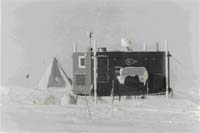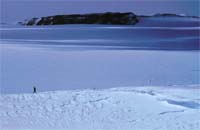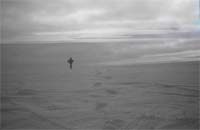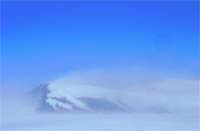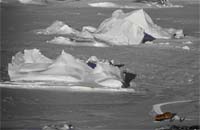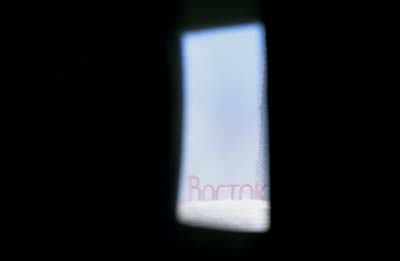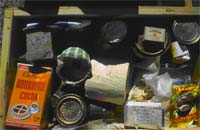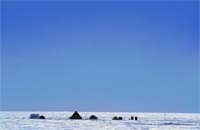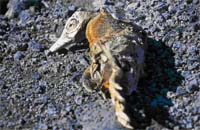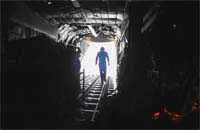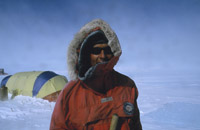Appendix
unpublished
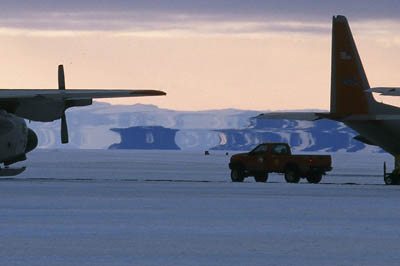
"I remember being much amused with a question which Hope asked me. Pointing to the large irregular place which is always left blank round the poles, to denote that it is undiscovered, he looked up and asked - 'Pau?' (Done? Ended?)"
—Richard Henry Dana, Two Years Before The Mast
Antarctica bounced up and down through the rear windows of the ambulance as I was driven over half-plowed drifts to the airfield. In early December of 2003, four days of severe storm silenced human activity in the Ross Sea region, as the Antarctic gales drove waves of snow through McMurdo Station and piled it several feet deep across roads and runways. Two days after the skies had cleared, still no planes had taken off. The wind still blew, and the plows were overwhelmed. My ambulance, however, was delivering me to the first available flight, a northbound to Christchurch, New Zealand.
I lay on a stretcher looking backward, jolted each time we forged our way up and over a wave of snow. Like most of McMurdo's vehicles, the ambulance has worn-out shocks. Through the rear windows, I watched the shaky receding image of my adopted home: dozens of large prefab warehouses, work centers, and dorms clustered together under the rough volcanic slopes of Ross Island. McMurdo is home to 1200 summer residents, a busy brown hive on the edge of Antarctica's vast ice caps. It is by far the largest community in Antarctica, and the heart of the United States Antarctic Program. The USAP is a federal entity managed by the National Science Foundation (NSF) to support science and help the U.S. hold onto its unofficial piece of the Antarctic pie. Civilian now but Navy-run for 40 years, McMurdo is the logistical hub for American efforts around the Ross Sea, the Transantarctic Mtns., the East and West Antarctic ice caps, and for our base at the South Pole.
Eight summers I've spent down south, each one stitching my imagination into the continent a little more firmly. And each time McMurdo jumped, I winced, though not out of nostalgia: Just as the storm hit six days earlier, I'd become seriously ill.I woke with severe pains in my abdomen, with unsolved Rubik's cubes passing through my intestines. I writhed for some time in bed, then woke Heather and told her I was going to Medical. I foolishly tried the "I'll be okay on my own" line, but she dialed the four-digit number for the doctor on call and helped me dress. One arm guarding my belly, the other around her, I walked slowly down the dormitory hall and stairs.
I first moved into one of McMurdo's 14 dorms in 1994. Depending on an employee's job title and/or years on the ice, a dorm room may be a windowless shell with three roommates and a shared bathroom down the hall of a noisy squat 2-story, or a plush corner room on the top floor of a newer 3-story with an en suite bathroom and a view of the Transantarctics.
From my earliest job in McMurdo's waste and recycling department, I moved on to fueling aircraft and building runways in remote field camps. Most recently, in 2001, a friend and I lived in small wind-shaken tents for a summer on a remote glacier, tending a runway no plane ever used. In all those years, my greatest injury was a pulled butt muscle, my worst illness an occasional cold or flu.
Now back for my eighth austral summer, having taken a year off and fallen in love with my Massachusetts redhead, I'd arrived in McMurdo with Heather in tow. Because Heather was new to the ice, I hadn't applied for a remote field job, and we settled happily into a 10x12 ft. dorm room and a workaday routine. Heather shuttled Air National Guard (ANG) aircrews and USAP passengers between town and the airfields, and I moved cargo with a younger crew. Heather and I wouldn't see much of the Antarctic hinterlands, but we had cafeteria food, science lectures, two old warped bowling lanes, two bars, and free movie rentals at our disposal. I was back in the bosom of Antarctica's largest settlement.
Outside, the storm had begun to smother the base. This was one of the massive south polar low pressure systems McMurdo's meteorologists like to say was "the size of France". I walked through blowing snow bent and cursing like an old man, Heather like a nurse at my elbow: "We need to move left, darling, the snow's deep up ahead." Whiteness swirled along the gravel roads at our feet, drifted across our view of a ghostly administrative building, and piled up against the loading door of a weathered bleached-green freezer warehouse. Weather that would have thrilled me on any other day just made me guard my stomach more closely. Raising my head to gauge the storm seemed a dangerous luxury.
Nothing else moved against the gusts but a few people holding their parka hoods down and scurrying between dorms. The storm had reduced visibility to a few hundred feet, and little of the town's scale could be seen beyond diminishing lines of pale telephone poles. Normally, McMurdo rumbles with the sounds of tracked vehicles, flatbed trucks and battered yellow forklifts. Back-up beepers chirp constantly.
We travel a base made of 100 buildings spread over a few square miles. Built up by accretion from a cluster of tents in 1955, McMurdo suffers a road plan as inefficient as a hasty suburban development. Cargo sprawls around the entire base in various provisional yards, and much of the warehousing consists of damaged shipping containers packed into tight rows. From the vantage of Observation Hill (a volcanic cone overlooking town), the constant trickle of orange trucks, yellow Caterpillar equipment, and people in red parkas or brown Carhartts moving between work centers looks like a scattering of corpuscles in a network of dying capillaries.
The doctors suspected appendicitis, especially as the pain migrated to the lower right of my abdomen. Further tests at a real hospital were necessary. The diagnosis would have to stand, however, as the storm consumed our corner of the continent. The ANG cancelled all flights, and rumor had it that planes would be grounded for a while. So, with belly rumbling, I was about to take up residence in McMurdo Medical, a worn-out 30-year-old clinic whose many uses did not include surgery.
Medical is now a competent civilian affair, but for most of its history it was a Navy clinic on an edge-of-the-world Navy base, and the capability of its staff varied from professional to dangerous. In 1996, at the end of the Navy era, the clinic gave my friend Deb three successive weeklong courses of antibiotics to kill a nasty ear infection before she flew in an unpressurized aircraft back to New Zealand. The first course was given by an orderly, the next by a nurse, and the final by a doctor, the latter two snorting at the foolishness of the previous prescriptions. None of the three worked, and Deb had a painful flight that damaged her hearing. She later showed the names of the antibiotics to her stateside doctor, who snorted and told her that all three were for venereal diseases.
My Cargo crew and I (and Heather, luckily) were on nightshift. "Nightshift" in the polar summer, under a 24-hour sun, is a relative term, but we're a smaller shift working on a quieter base. The staff at Medical works on dayshift, leaving one doctor on call each night. I stayed up into my wee hours of their morning while they looked into my case. After the initial tests (x-rays, blood work, urinalysis, and probing my tender belly with fingers), I was visited by J.J., the doctor in charge. We talked about the severe weather while looking at an ultrasound monitor full of snowy static. J.J. slid the paddle around my greased stomach while small inscrutable shadows pulsed amid the turmoil. I saw nothing, J.J. thought he found the appendix, but luckily some tea-leaf reader in Texas, who saw the digitized images sent via satellite, claimed that he had spotted the telltale swollen paper-thick walls of the infected vestigial organ. I thought it just as likely that I could stumble out onto the windswept sea ice to find a lost tissue.
Medical had only one real option: to put me on high doses of i.v. antibiotics and hope to stop the infection before the appendix burst. J.J. didn't know if the antibiotics would work, but he was sure I'd never make it through the storm without drugs or an operation.
J.J. looked mostly uncomfortable at the idea of turning part of the old clinic into a surgery unit. A kind but fidgety man, J.J. betrayed the irony of practicing Antarctic medicine; he'd come for an adventure at the end of the Earth, but had to act unadventurously in nearly every decision. I think in the back of both of our minds, however, the lure of doing something unusual under difficult circumstances was calling. Why not enter Antarctic history with a storm and a scalpel? Certainly, J.J. wouldn't gain the renown of the Russian doctor at isolated Vostok Station who in midwinter removed his own appendix, but he'd probably land a few interviews. I figured I could use it for my writing.
Meanwhile, J.J. told me that I was free to sleep during the day until the weather cleared. I happily returned to my graveyard shift, sleeping while the clinic buzzed. Nonetheless, a nurse kindly drew back the thin green curtain three days in a row to wake me, for lunch, in the middle of my night.
Heather joined me in my lonely nightshift whenever she could, knocking on the distant muffled door. She brought books, delivered meals from the galley, and acted as a messenger from well-wishing friends. (At each meal, she surprised someone with the news that I was ill in Medical; the storm had shut down everything, including McMurdo's notorious grapevine.) Mainly, though, she and I talked about what might happen next. Back in Maine, in our rented cabin, when we made our plans for Antarctic work and New Zealand travel, we hadn't counted on my losing work and instead racking up hospital bills in Christchurch. I might have to lay low, camping and recuperating in the New Zealand greenery, while she worked until the end of her contract in mid-February. Our travel afterward might be cut short.
There was little stress in this. Heather and I were in love, at ease with each other and the world. If plans changed, plans changed, and we'd sort it out. My fever soon diminished, as did my hopes for a famous surgery, but my belly still hurt and I picked up a cold from the sniffling patients passing through my new living room. I spent days curled up behind the curtain, and nights in purple hospital pants and my dirty work shirts, shuffling through an empty Medical. No one else but the sleeping on-call doctor inhabited the place. I might eaily have performed surgery on myself, gone through secret medical files, or cleaned my own teeth. As it was, when I wasn't reading, talking with Heather or occasional visitors (with McMurdo shut down by the storm, everybody had time off), I sent email on an office computer or made occasional pilgrimages to see the weather.
Medical has no windows, which for me is a form of torture. So in the hush of 2 a.m. or so, I'd trundle down the tiled hallway, towing an i.v. stand that had all the grace of a three-wheeled shopping cart. I pegged the inside door, then dragged the i.v. stand across the snow stomping grill in the entryway. Because clumps of snow and frost clogged up the 8-inch Plexiglas window in the front door, the door itself had to be my window. All exterior Antarctic doors open inward, in case of snowdrifts and storms like this, so I pushed down on the lever and yanked it open.
Outside it was blizzard and gale, white blowing through white, with pale forms of abandoned trucks flickering in the storm. Cottonball snowflakes melted against my warm face, while triangles of snow from the corners of the doorway crumbled down onto my bare feet. I felt like a child forbidden to leave his dull pastel room for the cold thrilling world. I wanted desperately to be out in the erasure, to be one of the small black spots in the continental Antarctic etch-a-sketch.
Antarctica has obsessed me and shaped the play of my imagination for much of my adult life. From my first days in 1994, staring out a truck window across the frozen ocean to the glacier-choked peaks of the Transantarctics, to my 2001 summer camping amid those peaks, I've been lucky enough to pursue my passion for the vast strangeness of the place.
In eight summers, I've managed to see nearly everything I came to see. I've worked at the South Pole at 10,000 feet and -60°F, and in the balmy 50°F weather of a coastal helicopter refueling camp wedged between a massive glacier and the melting sea ice. I've flown in helicopters over icebergs, penguins and orcas, in Twin Otters over city-sized crevasse fields, and in LC-130 ski-equipped Hercules turbojets over the China-sized East Antarctic ice cap, where ice up to three miles deep suppresses a continent below and supports no life above. I've lain awake and alone in a small tent within that continent-wide silence, as if settled - and unsettled - on a rough white frozen moon.
Mostly, however, I've spent my months walking and driving in circles through the jumble of fuel tanks and pre-fab buildings in McMurdo. On good days, the town is a beautiful, literally outlandish, mess on one of the world's last frontiers. On bad days, we seem like drones occupying an industrial park vomited onto the shoreline of the millennial ice. As if in a weather-beaten but prosperous port of some cold post-apocalyptic city, most of us plod from job to cafeteria to bed, only slightly conscious of the great strangeness beyond the town. We work, gossip with friends, drink and watch TV, and grow used to the limited connection to Antarctica we have in this Antarctic life. It's hard to focus on the aesthetics of an icy emptiness when you're hungry, pissed off at management, and reeking of diesel.
But I never let go of the sense of impossibility I felt everywhere, whether carrying a dumpster on a forklift between brown dormitories or shuffling out from a warm-up shack to fuel another roaring plane. The snow glows with ten thousand shades of blue and gray; light flows uninterrupted over the wind-carved glaciers; and a continent that contains neither tree nor shrub somehow offers me an intensified, abstract solace.
My notebooks filled up with entries on the aesthetics and geography of the ice, the history of exploration and science, and a personal experience set against the white backdrop of an Antarctica that is severe and luxurious, inhuman and political, antibiotic and intimate. I scribbled about Antarctica's cold beauty from the warmth of a town I castigated for its ugliness. Over the years, and especially during months of focused effort in New Zealand apartments, I read dozens of Antarctic books and worked on my writing. From small melodramatic images connecting self to icy abstraction…
I'm off to an arranged marriage with the snows, a honeymoon with the metaphysics of cold.
A white question mark on a whiter page.
…to essays like this carved out of a 100,000 word notebook built of narrative and poetic fragments, I wrote the ice into my life. And all through this 2003 summer, before my appendix wrote itself into my life, I spoke with Heather and my friends in Cargo, helplessly at times, from the pages of my notebooks.
By the time we'd settled into McMurdo, Heather knew from all my talking and writing about Antarctica that some part of me had been lost to the empty white space filled with glare and glitter and the illumined pastels of polar evenings. I'm haunted by years of looking into this space that takes the human perspective and exhausts it.
In early October, not long after our arrival, with the summer sun still low over the mountains, she'd said, "It's strange to see it, all the landscape you've written about. Out there on the sea ice are the streams of snow blown by the wind. They're so beautiful, the way they move in this yellow light. And the lines on the hills, those are really all bulldozer marks?"
"They scrape some of that volcanic gravel down every time there's a major road project in town. And just when you think that the blowing snow on the sea ice is an abstract image, you'll notice a seal sleeping in the middle of it, snoring through a -100°F wind chill."
My Cargo crew would build a shipment for, say, a science group using GPS to measure continental shift in the Ford Ranges, and somebody would ask where the Ford Ranges were. Eager to explain, I'd jump in. "They're in West Antarctica, near the coast, about 2 hours away by Herc. It's a beautiful place. I flew there several years ago to deal with a leaking fuel bladder. I was the only passenger, so I sat in the cockpit as we landed. What makes it so beautiful is that the ice cap there is sort of peppered with small peaks sticking up through the ice, like islands." A pause, and then more info: "The peaks were named for Edsel Ford, a big supporter of Admiral Byrd's expeditions."
Much of Cargo time is downtime, waiting during 12-hour shifts for flights to arrive or depart. Either we're in a panic to load or offload the Hercs (orchestrating forklifts, trucks, sleds, vans and passengers), or we're slack-jawed in the warm-up shack, sitting on couches and talking, reading or napping. Aside from some stories about New Zealand travel or my family in Maine, what I brought to the conversation was largely Antarctic. Stories and facts rolled off my tongue. The crew got used to me, even turning to me with questions.
Eric asked how Mt. Erebus, the steaming volcano that looms over McMurdo, got its name.
Me: "It comes from Greek mythology. Erebus is the place the dead pass through on their way to Hades. But the mountain was named for James Ross' ship on his 1841 expedition. The ship happened to be an old British navy bomb vessel. All the bomb ships carried gunpowder and cannonballs and had ominous names. So it's just a coincidence that our volcano has a name which means a path to the underworld."
Dani's story of a tyrannical supervisor during her McMurdo winter reminded me that in the Antarctic, bad management has often nipped at the heels of great courage.
Me: "There's a long history of these guys down here. I think the isolation brings out the best and worst in people. In 1899, Borchgrevink tried to demand oaths of loyalty from his men in their hut at Cape Adare. A few years later, Robert Scott put one of his Discovery expedition sailors in irons for disobedience. Finn Ronne, who led expeditions in the 40s and 50s, was such a bastard that Jennie Darlington called him 'the Ahab of the Antarctic.' He censored his scientists' personal telegrams and cheated at games. And here in McMurdo, the NSF was still censoring scientists' emails as late as 1990. And they apparently ignored the cover-up of illegal asbestos removal from Dorm 204 a couple winters ago."
"But what about the law down here? Doesn't U.S. law apply to the ice?"
"Yes and no. Or, my cynical view is that it applies when it benefits the NSF. We work for a bureaucratic American operation in a no-man's-land. There's no one but HR to turn to if we think management has screwed us, and HR is management. There's no other authority here. There's nothing in the Antarctic Treaty that works like OSHA, for example, when we're told to do stupid risky work. We can't avoid income tax here, because Antarctica is not officially a foreign country, but the NSF picks and chooses which rights its workers get to keep when they cross the Southern Ocean. It's taxation without full representation."
"That's bullshit."
"Sure, but you got picked out of a pile of applications to come here. They can ship you out and replace you pretty easily, although at some taxpayer expense. It's a buyer's market, and we're just peons selling our labor because we want an adventure. Part of that adventure means dealing sometimes with bad leadership in a difficult place. Like my friend Nicholas says in his book Big Dead Place, nobody quits the USAP because of the cold and isolation, but plenty leave because of the bullshit." I wasn't any better at the Cargo job than they were, but as the weeks of our summer passed in conversation, I spewed out the background for our 21st century movement of artifacts around the Antarctic icescape. It's a bittersweet knowledge, of course, like all histories: the romance and heroism ascribed to Antarctic work is mostly fiction, just as roughly 80% of us are workers rather than scientists.
The problems of boredom and backbiting occupy us at work on the ice just as much as they do at home, but on the ice there's nowhere else to go. It's easy to get tired of the psychological wear-and-tear of no options, especially if like most employees you never leave McMurdo for the wilderness. McMurdo is a fascinating microcosm of American society, but it's often a profoundly unhealthy place. Many thoughtful people have come down to the town for one austral summer, felt the limitations, then walked away saying Never Again.
At age 36, I felt like the old man on my Cargo crew, a scraggly-bearded Antarctic guide. Such a man doesn't amount to much, but we were a new friendship circling around a storied landscape I had known longer and loved more deeply. I had begun to worry, however, that I'd spent so much time writing and talking about the ice that the Antarctic was becoming "the Antarctic" for me, a recycled collection of ideas and anecdotes.
And now that I'd become ill during a major blizzard, I was little more than an anecdote myself. I was just a plane ride away from being another memory in town of transients. One moment I had been the old hound of my Cargo crew, the Antarctic know-it-all. Then, a moment later, dressed in purple hospital pants, I was the prelude to dust, a nostalgic egghead leaning gently into the white maelstrom from Medical's front door.
And out of the maelstrom one evening, my Cargo gang showed up, shuffling awkwardly around the bed. They had no planes to load or unload, nothing around their forklifts but the weightless clouds of snow. I greeted them with the embarrassed pleasure of the bedridden.
Tom talked up his illicit solo adventure into the teeth of the wind at the far end of town, showing me his digital video of being knocked down by a gale blowing out of, as he said, "the gates of hell". During a Condition 1 storm, the rules prohibit employees leaving their buildings, except for meals. People have lost their way in these whiteouts, plywood and sheet metal have sailed like kites. The fact that Tom blindly staggered a mile up the road alone would give the NSF apoplexy. I felt jealous of his journey, jealous of his health. I had not spent all these years on the ice to be pinned under fluorescent lights during warehouse-shaking storms.
Dani and Ira talked about the ironic peacefulness of a buffeted McMurdo, the calm in human activity caused by the storm. Dani said, "It's only at times like this that this place feels like a home instead of a work camp." Ira, who after three months in the USAP had already said Never Again, who came to McMurdo expecting (like so many of us) to test his endurance amid hypothermia rather than industrial claustrophobia, said that he felt like he'd finally reached Antarctica. Eric finally asked what the doctors were saying about my gut.
"They've been soaking me in antibiotics since I got in here, and it looks like it's helping, maybe so much so that I'll avoid surgery here. Lord forbid I get operated on in this place. My dorm room would be more sterile. But it would make for an excellent story… I'm still heading to Christchurch for follow-up and because the appendix probably still needs to be cut out."
"Are you coming back, dude?"
"I don't know. Surgery means a small hole in my stomach muscles, and that may make me useless for work. It all depends on the recovery time. Supervisor knows I want to."
I knew I wanted to. Heather would be on the ice. Work and the money to pay off the upcoming hospital bills would be on the ice. My last decade and the entire spin of my creative life were on the ice.
J.J. came in around midnight, sleepy and nervous that there were too many people in his clinic, though the place was empty except for us. We promised him only 20 minutes more, and in 20 minutes he dutifully came in again and sent the gang shuffling out into a white darkness.
I knew also that I had to take a patient's view. I'd been laid flat by fate. Maybe everything receding through the ambulance window - eight summers of work, friendship, exploration, art and weather - should keep receding, ripped from my life by storm. Heather and I have the rest of our lives together. Bills will somehow get paid.
At the end of a summer contract, I have always been glad to leave the confines of McMurdo. But Antarctica, the pearl that surrounds the grit, is the hardest place to abandon I've ever known. Like a sailor home from a frozen sea, dreams composed of ice, light and distant horizons occupy my imagination wherever I go. And after a few months away, the memories of the hassles grow dimmer and dimmer.
And the road to the runway was bumpy and getting bumpier. I grimaced with each snowdrift. But as the ambulance turned onto the airfield, volcanic Mt. Erebus hove into view, steam rising from the inner workings of the bubbling Earth. All that heat and bother: like my belly, and like the busy world that awaited me.
As we pulled up to the Herc, the peaks of the Transantarctics chattered past, the gaps between them flooded with ice pouring in from the East Antarctic ice cap. Sliced into that continent of ice are crevasses large enough to contain McMurdo, thrown in one building at a time, like a child fills up his toy box.
|
© Copyright Jason Anthony All rights reserved. |

